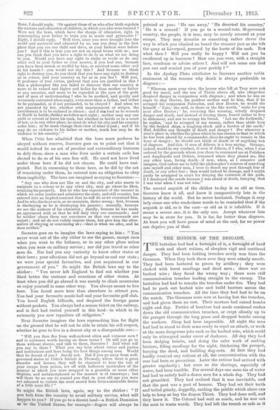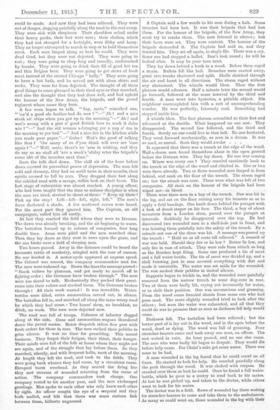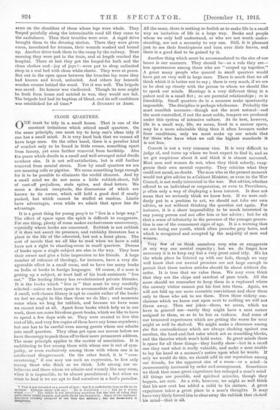THE HONOUR OF THE BRIGADE.
THE battalion had had a fortnight of it, a fortnight of hard work and short rations, of sleepless vigil and continual danger. They had been holding trenches newly won from the Germans. When they took them over they were utterly unsafe. They had been battered to pieces by artillery ; they were choked with burst sandbags and dead men ; there was no barbed wire ; they faced the wrong way ; there were still communication trenches leading straight to the enemy. The battalion had had to remake the trenches under fire. They had had to push out barbed wire and build barriers across the communication trenches. All the time they had had to be on the watch. The Germans were sore at having lost the trenches, and had given them no rest. Their mortars had rained bombs night and day. Parties of bombers had made continual rushes down the old communication trenches, or crept silently up to the parapet through the long grass and dropped bombs among the workers. Sleep had been impossible. All night the men had had to stand to their arms ready to repel an attack, or work at the more dangerous jobs such as the barbed wire, which could only be attempted under cover of darkness. All day they had been dodging bombs, and doing the safer work of making latrines, filling sandbags for the night, thickening the parapet, burying the dead, and building dug-outs. At first they had hardly received any rations at all, the communication with the rear had been so precarious. Later the rations had arrived with greater regularity ; but even so the shortage, especially of water, had been terrible. For several days one mess-tin of water had had to satisfy half-a-dozen men for a whole day. They had not grumbled. They bad realized that it was inevitable, and that the post was a post of honour. They had set their teeth and toiled grimly, doggedly, sucking the pebble which alone can' help to keep at bay the demon Thirst. They had done well, and they knew it. The Colonel had said as much, and he was not the man to waste words. They had left the trench as safe as it
could be made. And now they had been relieved. They were out of danger, slogging painfully along the road to the rest camp. They were sick with sleepiness. Their shoulders ached under their heavy packs, their feet were sore ; their clothes, which they had not changed for a fortnight, were filthy and lousy. They no longer attempted to march in step or to hold themselves erect. Each man limped along as best he could. They were dead tired, but they were not dejected. They were going to rest ; they were going to sleep long and soundly, undisturbed by bombs. They were going to drink their fill of good hot tea and thin Belgian beer. They were going to get stews of fresh meat instead of the eternal Chicago "bully." They were going to have a hot bath, and be served out with clean shirts and socks. They were far from dejected. The thought of all these good things to come gleamed in their tired eyes as they marched, and also the thought that they had done well, and had upheld the honour of the New Army, the brigade, and the proud regiment whose name they bore.
A few even began to talk. "Say, mate," remarked one, " 'ow'd a good ole feather-bed do now ? "—" Ah I and a nice steak an' chips when you got up in the morning."—" Ah and wot's wrong with a pint o' good British beer to wash it dahn wiv 1"—" And the old woman a-bringing yer a cup o' tea in the morning to yer bed."—" And a nice fire in the kitchen while you reads your paper."—" Galin! Wot's the good of talking like that ? 'Ow many of us d'you think will ever see 'ems again "—" Well, mate, there's no 'arm in wishing, and they do say as we shall all 'ave a week's 'oliday arter the brigade's come aht of the trenches next time."
Soon the talk died down. The chill air of the hour before dawn exerted its proverbial power of depression. The men felt cold and clammy, they had an acrid taste in their mouths, their spirits seemed to fall to zero. They dragged their feet along the cobbled road with a savage, sullen look on their faces. The last stage of exhaustion was almost reached. A young officer, who had been taught that the time to enforce discipline is when the men are tired, started to shout at them: " Keep up there Pick up the stop 1 Left—left--left, right, left." The men's faces darkened a shade. A few muttered curses were heard. For the most part they ignored him. The Captain, an old campaigner, called him off curtly.
At last they reached the field whore they were to bivouac. The dawn was already breaking, and the air beginning to warm. The battalion formed up in column of companies, four long double lines. Arms were piled and the men marched clear. Then they lay down as they were in rows upon the grass, and the sun broke over a field of sleeping men.
Two hours passed. Away in the distance could be heard the incessant rattle of musketry, mingled with the roar of cannon. No one heeded it. A motor-cycle appeared at express speed.
The Colonel woe roused, the company commanders sent for.
The men were wakened up. Down the lines the message passed : "Stack valises by platoons, and get ready to march off in fighting order ; the Germans have broken through." The men were too dazed to talk. Mechanically they packed their great- coats into their valises and stacked them. The Germans broken through! All their work wasted ! It was incredible. Water. bottles were filled, extra ammunition served out, in silence. The battalion fell in, and marched off along the same weary road by which they had come. • Two hours' sleep, no breakfast, no drink, no wash. The men were dejected now.
The road was full of troops. Columns of infantry slogged along at the side. Guns and ammunition-wagons thundered down the paved centre. Motor despatch riders flew past with fresh orders for those in rear. The men sucked their pebbles in grim silence. It was no time for grumbling. This meant business. They forgot their fatigue, their thirst, their hunger. Their minds were full of the folk at home whom they might not see again, and of the struggle that lay before them. So they marched, silently, and with frequent halts, most of the morning. At length they left the road, and took to the fields. They were going back whence they had come, by a circuitous route.
Shrapnel burst overhead. As they neared the firing line they met streams of wounded returning from the scene of action. The company commanders took charge. One company rested to let another pass, and the men exchanged greetings. Men spoke to each other who only knew each other by sight. An officer caught the eye of a eerporal and they both smiled, and felt that there was some curious link between them, hitherto unguessed. A Captain said a few words to his men during a hat. Some trenches had been lost. It was their brigade that had lost them. For the honour of the brigade, of the New Army, they must try to retake them. The men listened in silence ; but their faces were set. They were content. The honour of the brigade demanded it. The Captain had said so, and they trusted him. They set off again, in single file. There was a cry. Some one had stopped a bullet. Don't look round ; he will be looked after. It may be your turn next.
They lay down behind a bank in a wood. Before them raged a storm. Bullets fell like haiL Branches were carried away, great tree-trunks shattered and split. Shells shrieked through the air and burst in all directions. The storm raged without any abatement. The whistle would blow. Then the first platoon would advance. Half a minute later the second would go forward, followed at the same interval by the third and fourth. A man went into hysterics, a pitiable object. His neighbour contemplated him with a sort of uncomprehending wonder. He was perfectly, fatuously cool. Something had stopped inside him.
A whistle blow. The first platoon scrambled to their feet and advanced at the double. What happened no one saw. They disappeared. The second line followed, and the third and fourth. Surely no one could live in that hell. No one hesitated. They wont forward mechanically, as men in a dream. It was so mad, so unreal. Soon they would awake . . .
It appeared that thero was a trench at the edge of the wood. Half-a-dozen men found themselves alone in the open ground before the German wire. They lay down. No one was coming on. Where was every one ? They crawled cautiously back to the trench at the edge of the wood and climbed in. One or two were there already. Two or three wounded men limped in from behind, and sank on the floor of the trench. The storm raged on ; but the attack was over. These were what was loft of two companies. All stain on the honour of the brigade had been wiped out—in blood.
There were three men in a bay of the trench. One was hit in the leg, and sat on the floor cutting away his trousers so as to apply a field bandage. One knelt down behind the parapet with a look of dumb stupor on his face. The third, a boy of about seventeen from a London slum, peered over the parapet at intervals. Suddenly he disappeared over the top. He had discovered two wounded men in a shell-hole just in front, and was hoisting them painfully into the safety of the trenoh. By a miracle not one of the three was hit. A message was passed up the trench " Hold on at all costs till relieved." A council of war was held. Should they fire or lie low ? Better lie low, and only fire in case of attack. They were safe from attack as long as the Bosehes kept firing. Some one produced a tin of moat and a full water-bottle. The tin of meat was divided up, and a shell bursting just in rear covered everything with dirt and made it uneatable. The water was set aside for the wounded. The rest sucked their pebbles in stoical silence.
Supports began to trickle in, and the wounded were painfully removed from the narrow trench to some dug-outs in rear.
Two of them were badly hit, crying out incessantly for water, or to shift their position. One was unconscious and groaning. From the wood came frenzied shouts from some ono who had gone mad. The more slightly wounded tried to look after the others; but soon the water was exhausted, and all that they could do was to promise that as soon as darkness fell help would come.
Darkness fell. The battalion had been relieved ; but the bettor part of it lay out in the wood, and in the open before the wood, dead or dying. The wood was full of groaning. Four stretcher-bearers came and took away ono man, an officer. The rest waited in vain. An hour passed, and no one else came.
The men who were badly hit began to despair. They would die before help came. For Christ's sake get some water. There was none to be had.
A man wounded in the leg found that he could crawl on all fours. He started to look for help. He crawled painfully along
the path through the wood. It was choked with corpses. He crawled over them as best he could. Once he found a full water- bottle, which he gave to a sentry to send back to his mates. At last he was picked up, and taken to the doctor, while others went to look for his mates.
The doctor was in a field. Rows of wounded lay there waiting for stretcher-bearers to come and take them to the ambulances. As many as could went on, those wounded in the leg with their arms on the shoulders of those whose legs were whole. They limped painfully along the interminable road till they came to the ambulance. Then their troubles were over. A rapid drive brought them to the dressing station. There they were given cocoa, inoculated for tetanus, their wounds washed and bound up. Another drive took them to the camp by the railway. Next morning they were put in the train, and at length reached the hospital. There at last they got the longed-for bath and the clean clothes and—joy of joys !—were put to sleep unlimited sleep in a real bed with clean white sheets. They were at peace. But out in the open space between the trenches lay some they had known and loved, unburied. And others lay beneath wooden crosses behind the wood. Yet it was well. The brigade was saved. Its honour was vindicated. Though its men might be fresh from home and untried in war, they would not fail. The brigade had had its baptism of blood, and its self-confidence




















































 Previous page
Previous page